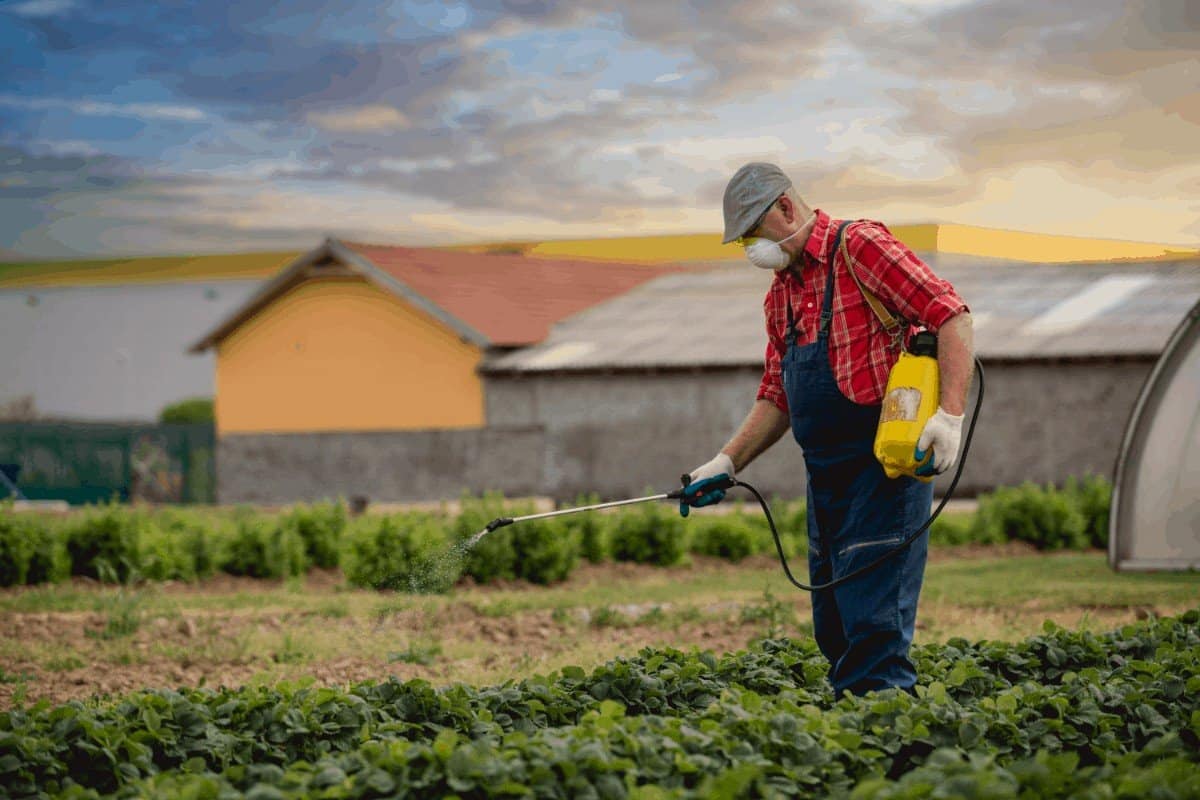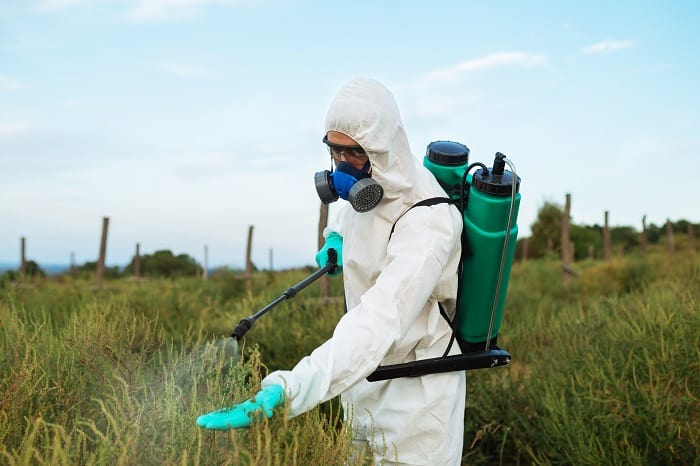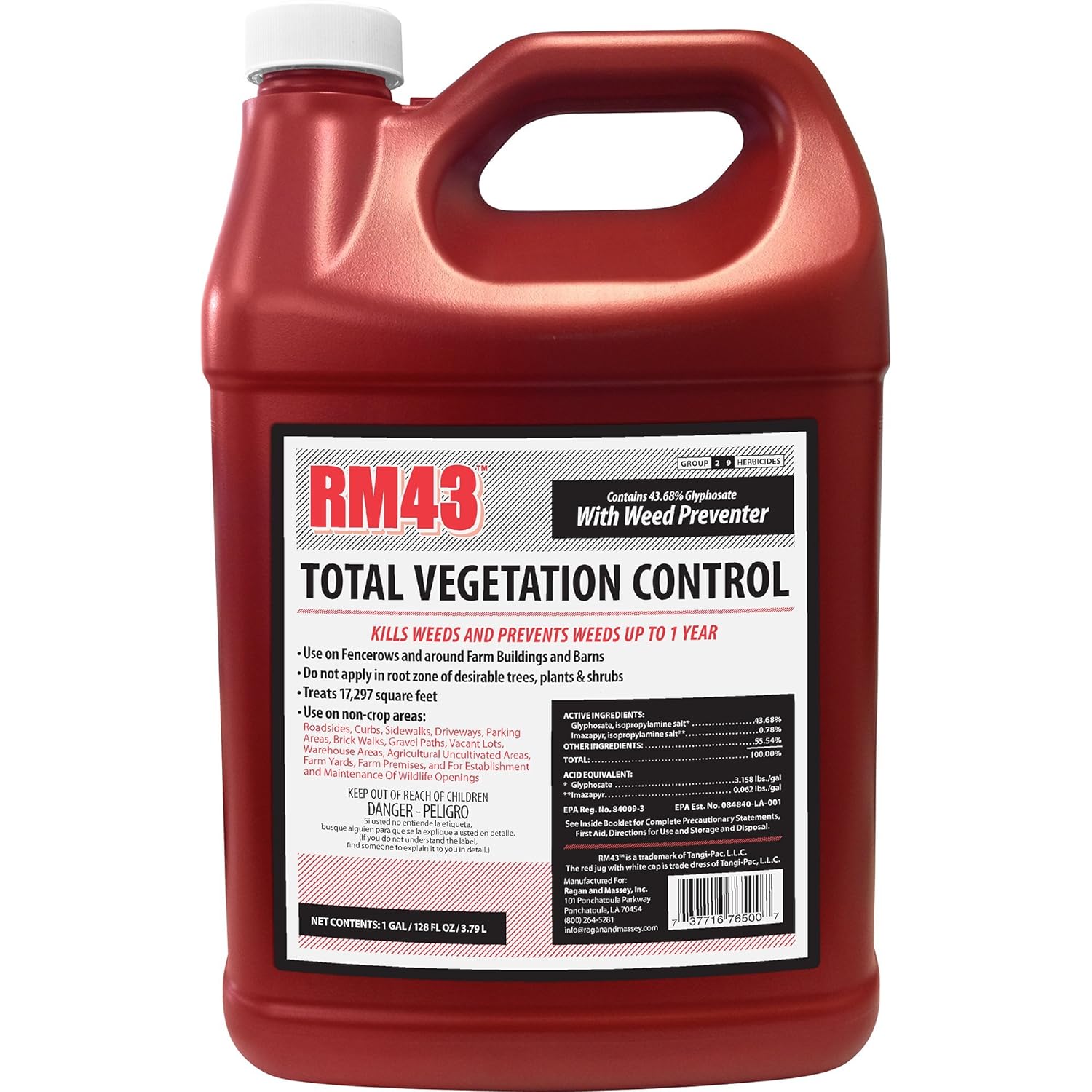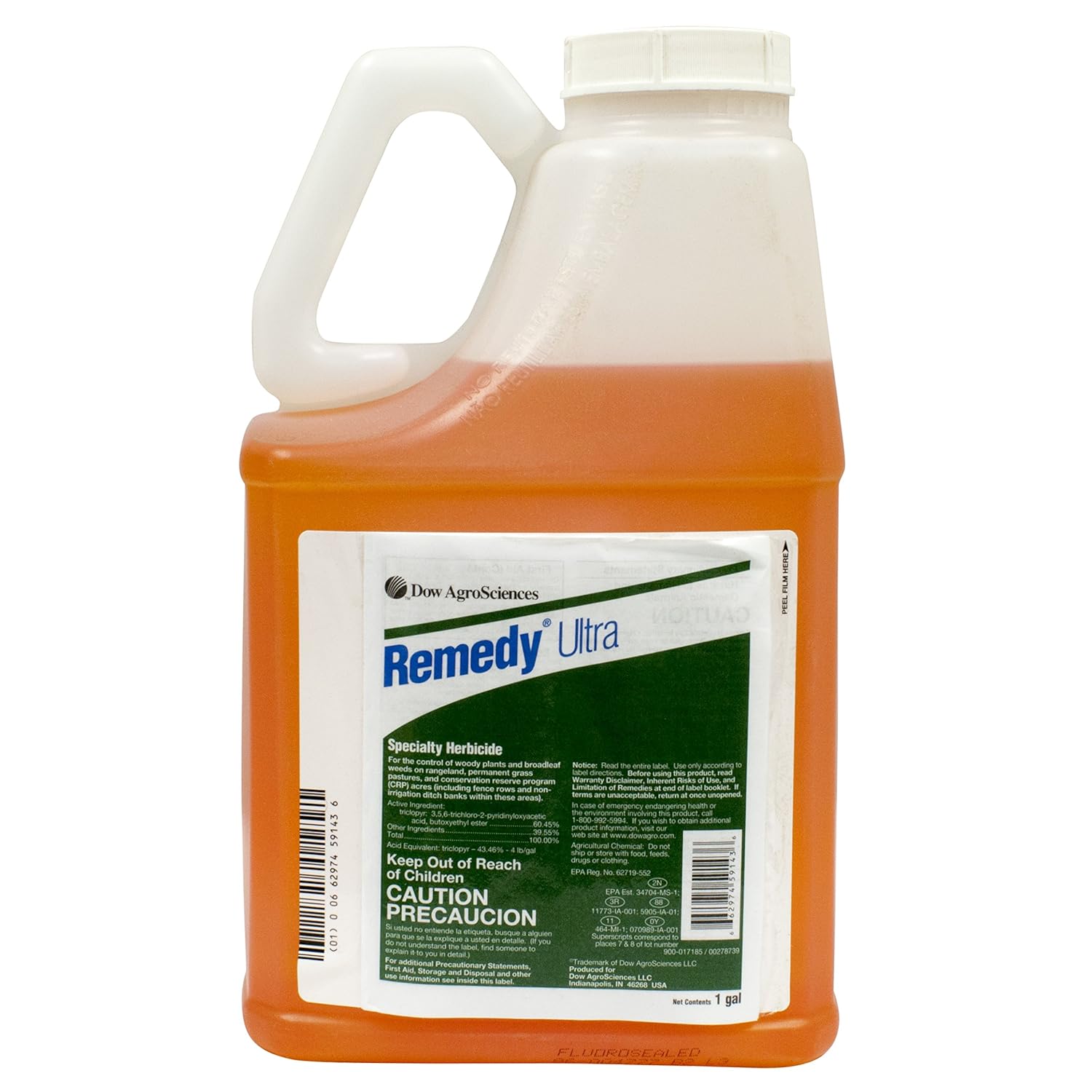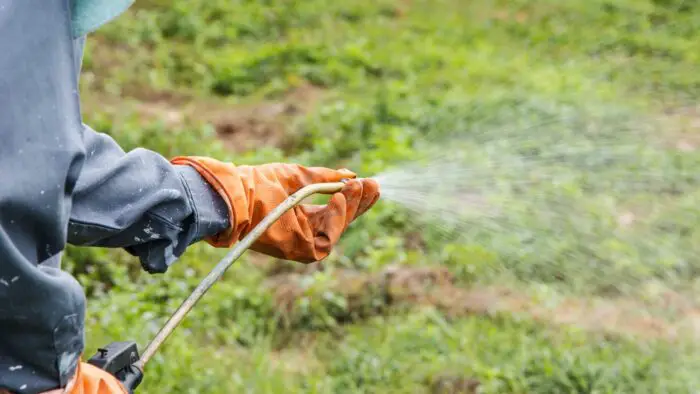Last Updated on March 2, 2023 by Griselda M.
This blog post concentrates on the best permanent grass killer and additional information that is useful to your landscape. A common issue for the average individual who owns a property is trying to control the rampant spread of weeds and errant grass. Throughout history, humans have owned livestock to help keep these growths to a minimum. In the modern age, people need to rely on their own hard work and ingenuity instead.
To be as effective as possible, you should invest in a permanent killer of grass and weeds to keep manual labor to a minimum. While it is possible to remove grass, clover, dandelions, and crabgrass by hand, a more ideal solution is using a spray herbicide that can be applied directly to the problem and then require no more work for the rest of the year.
Because there are many herbicides on the market, it’s important to know what you’re getting yourself into when buying one. After all, using the wrong ingredients can leave a plot of land barren for months and even years. Here, the best permanent killers of grass and weeds from 2019 are examined to help you find the right option for you.
What to Know When Picking an Herbicide
An herbicide is a substance that is designed to be toxic to plants and is meant to be used as part of pest management. Plants qualify as pests when they start to choke out desired fruits, vegetables, flowers, and even grass.
Herbicides have been around for a long time and have undergone numerous changes over the years. While people no longer use mercury as a pesticide, there are still many toxic ingredients in the most effective herbicides that are important to know. Here is some of the info you need when trying to find the best permanent killers of grass and weeds.
Organic vs. chemical
Every ingredient in an herbicide counts as a chemical, but people draw a difference between models that try to use environmentally friendly, organic ingredients and those that focus on chemicals. While organic herbicides are simple and tend to be safe around pets and children, they are not effective killers. For this reason, many of the products on this list fall into the traditional “chemical” category. However, there are some organic alternatives, but they require multiple sprays to become truly permanent killers.
When you choose to go the organic route, it’s important to look for acetic acid, which is basically vinegar under its official name. Just as this ingredient can kill the taste buds, it can also eliminate unwanted plants by targeting both exterior and interior cells.
Common ingredients
Some of the most frequently seen ingredients in effective herbicides are acetic acid, glyphosate, pelargonic acid, and sethoxydim. These components share similar characteristics, including being acidic and producing a ‘burn’ effect that kills weeds and grass by targeting the visible portion and then seeping into the soil to kill the roots. Since these are the most effective ingredients, it’s important to search for a product that includes at least of these when choosing the best permanent killers of grass and weeds.
Easy to use
When shopping for the best permanent killer, you need an option that you can actually use effectively. Most of the powerful herbicides come in a liquid format that requires a separate container to be used. So, you might need to invest in a spray bottle or a more reliable backpack sprayer that you can carry around.
However, liquid herbicides are simpler and easier to use than granules, which tend to clump and require the user to get closer to their target. For this reason, the pesticides on this list are liquids that can be transferred to other containers and sprayed. While granules can be effective, they are difficult to target specific plants and might disintegrate and hit the roots of desired growths.
Check Out These Powerful Options
Green Gobbler Vinegar Weed & Grass Killer
Besides sounding similar to the Green Goblin from Spiderman, the Green Gobbler Vinegar Weed & Grass Killer stands out from the competition by primarily relying upon acetic acid, also known as vinegar. This is a powerful herbicide that attacks unwanted vegetation deep in the roots to stop it from returning even as the visible part of the plant dies. Unlike some other herbicides, this one comes in a bottle with an optional spray top, so it doesn’t need to be transferred to another container to be used.
Each bottle of Green Gobbler includes 1 gallon of liquid that can be used around driveways, walkways, backyards, gardens, fences, and other locations. It can be applied in residential, commercial, industrial, and even agricultural properties. A 30-day money-back guarantee is included with each purchase, and the product is certified for organic use. If you want an herbicide that will protect the home vegetable garden, then this is it.
Because this product is organic, it might take a couple of applications to be the most effective. However, it can kill a variety of weeds and grass, including crabgrass, dandelions, chickweed, and more.
Pros
- Uses organic ingredients
- Can be used on all types of property
- Comes with a sprayer for easy use
- Includes a 30-day money-back guarantee for use
Cons
- Requires multiple applications to be the most effective
RM43 43-Percent Glyphosate Plus Weed Preventer
This herbicide comes in containers that hold 32 fluid ounces, or roughly 1 quart of liquid. The primary ingredient is glyphosate, one of the most efficient killers of unwanted weeds and grass for commercial and residential properties. While it needs to be transferred to another container, it can be used to treat just about every spot around the yard, including driveways, walkways, gardens, and fence lines. Because of its strength, the RM43 should not be used around the root areas of trees and desired vegetation.
Once RM43 has been applied to the ground, no unwanted vegetation will grow for up to 12 months, meaning areas only need to be treated once. This is an excellent option for someone tired of treating their yards every few months to eliminate unwanted grass and weeds. A single container treats around 4,300 sq. ft. and can be used on woody plants or vines that grow along the sides of buildings.
Pros
- Can make up to 5 gallons of spray solution when mixed
- Treats a large area effectively
- Stops unwanted vegetation growth for 1 year
- Uses strong ingredients
Cons
- Can kill larger plants when misused
- Needs to be transferred to another container
Remedy Ultra Specialty Herbicide Weed Killer & Brush Control
The Remedy Ultra Specialty Herbicide is an extremely strong model designed to kill wild plants that grow around designated areas like backyards, pastures, and driveways. The main ingredient is triclopyr, a powerful and acidic herbicide that starts to kill unwanted grass and weeds on contact. Because of its power, targeted grass and weeds will not return after thorough spraying.
Keep away this herbicide from children, pets, and other animals because it contains highly toxic chemicals. However, it is extremely effective. You need to pour the mixture into a separate sprayer since one is not included in the original bottle. Despite its strength, this is an economical option that actually has a low environmental impact since it dissipates quickly once in the soil. Unlike other options, it can control brush and plants with woody stems. Each container holds 1 gallon of solution.
Pros
- Powerful and acidic
- Can be used in fields and large areas
- Targets weeds, grass, and brush
- Low environmental impact
Cons
- Needs to be transferred to a sprayer
- Some environmental impact
Natural Armor Weed & Grass Killer
This Natural Armor Weed & Grass Killer comes in an easy-to-use spray bottle and is available in multiple sizes, so buyers can choose just how much herbicide they need to kill the grass and weeds in their yard. This is one of the few organic herbicides that continues to be effective against weeds and grass, although it will take multiple sprays to build an effective base for killing unwanted plant life. Each ingredient is safe for people and pets, so people can spray with confidence.
You can use The Natural Armor herbicide in gardens, driveways, walkways, and around pre-existing flowers and desirable plants. This product kills over 250 weeds and grasses and will not contaminate groundwater or kill wildlife like birds or fish.
Pros
- Includes effective organic ingredients
- Safe to use around pets
- Includes a sprayer on the bottle
Cons
- Requires multiple sprays to be effective
Best Weed Killer Tractor Supply Company
When it comes to the Best Weed Killer Tractor Supply Company, there are several useful herbicides available to suit your need. In agriculture, the most widely used herbicide is glyphosate, while the home and garden varieties that are glyphosate-based products are the second most utilized products by homeowners and gardeners. However, it is important to keep in mind that glyphosate is a nonselective herbicide. This means that it does not pick and choose the plants it kills, as anything in its path will be equally affected.
Here are our two best herbicides from the Tractor Supply Company:
Ragan & Massey 2.5 gal. FW 53.8% Glyphosate Grass and Weed Killer
With no soil residual activity present, this product is a post-emergent, systemic herbicide. It is a non-selective grass and weed killer that controls perennial weeds, annual weeds, trees, and woody brush on a broad spectrum. Ragan and Massey Glyphosate Grass and Weed Killer is a water-soluble herbicide and is commonly applied using sprayers that are industrial or field-type. There are specific instructions and directions on the label that indicates diluting and mixing the weed killer with water before use.
Notable points:
- This herbicide is ideal to use around your farm or home to control weed and grass growth.
- The label also states the directions for use in trees, shrub crops, pastures, annual and perennial crops, and roundup-ready crops.
- It is best to use the Ragan & Massey herbicide with a nonionic surfactant.
- The product includes a 2.5 gal. glyphosate grass and weed killer.
- It has no soil residual activity and is a post-emergent systemic herbicide.
FarmWorks 1 gal. 53.8% Glyphosate Grass and Weed Killer Concentrate
The FarmWorks Glyphosate Grass and Weed Killer Concentrate is a non-selective herbicide that affords users a broad spectrum control that covers trees, wood brushes, perennial weeds, and annual weeds, amongst others. It is a water-soluble liquid that is a systemic, post-emergent herbicide that does not produce any soil residual activity. Standard field and industrial sprayers are recommended when using this effective product.
Notable points:
- It is best for controlling the growth of trees, wood brush, and annual and perennial weeds.
- The product includes a 1 gal container of herbicide.
- The label comes with clear instructions and directions for easy use and application.
- This weed and grass killer can also be used with a nonionic surfactant.
If you have a landscape full of plants, then using selective herbicides for grass is recommended. This is because selective herbicides are developed to target specific broadleaf or grassy weeds without interfering with other garden plants. In other words, you can spray your entire lawn to get rid of unwanted weeds without worrying about damaging or killing the existing grass. There are a variety of selective herbicides to choose from. If you want to get rid of the grass and weeds, then there are ones that are designed for both these purposes.
By being specific when searching for the right grass killer, you will narrow down your search substantially. If you have to look at the liquid selective herbicide Bow and Arrow, it is specifically used to control creeping oxalis, cudweed, white clover, broadleaf weeds, capeweed, plantain, bindii, and cat’s ears. However, using it on grasses like zoysia and buffalo would also prove beneficial in getting rid of them.
Other effective selective herbicides for grass include the Fahrenheit Herbicide and 2,4-D Amine Selective Weed Killer. These products work well in cool and warm season lawns and for aquatic weeds and trees. This is because they are dual-action systemic herbicides that are effective.
Grazing Pasture Herbicide
There are a lot of things to consider when choosing a grazing pasture herbicide. Growers are sometimes against using chemical products to control weed growth in pastures. This is due to personal choice, costs, restrictions, and a lack of selectivity, amongst others. In this case, implementing effective management plans is essential. Although controlling weed growth without chemicals is a viable option, there are several things to consider if opting for this method.
We all know that weeds have undesirable traits and can be poisonous, which essentially leads to reduced animal and forage productivity. They spread very quickly because of their prolific seed production capabilities and, therefore, would require the use of proper production practices to keep them at bay.
Plant growth regulator herbicides are recommended for the control of broadleaf weeds that are common in grazing pastures. 2,4-D clopyralid, triclopyr, and dicamba products are recommended in this instance.
Alternatives to Glyphosate in Agriculture
When it comes to alternatives to glyphosate in agriculture, soil residual PRE herbicides are the most common options. These include products such as atrazine, prosulfocarb, triallate, trifluralin, and pyroxasulfone. These herbicides are often used to control weeds like annual ryegrass just before seeding. Keep in mind that in agriculture, reducing the use of glyphosate will have a greater demand for PRE herbicides that are not affected by soil microbes.
In this case, the resistance of soil residual herbicides will increase due to the reliance on PRE herbicides. This means that effective weed management strategies need to be in place to gain ultimate control. By this, I mean that growers will have to implement crop rotation strategies that allow for the use of PRE herbicides. Additionally, other weed control measures will also have to be in place to get favorable results.
Conclusion
Choosing the best permanent killer of grass and weeds includes many checks and balances. While truly toxic herbicides tend to be the most effective, they can murder the surrounding plants and leave the land barren for many months. For this reason, the number one choice on this list is actually an organic option: the Green Gobbler. Green Gobbler Vinegar Weed & Grass Killer manages to use effective ingredients without murdering the surrounding vegetation, making it an excellent option for someone who lives in a residential area and has a garden that needs tending.
FAQs
What kills weeds and grass permanently?
Many gardeners believe that killing weeds and grass permanently means going all-natural to remove weeds by hand. Gardeners may also try plants like dandelions which are natural for controlling the growth of weeds and grasses in gardens.
Weeds and grass are plants that do not have any natural enemies. However, the two plants can be killed by a number of factors, such as herbicides. Herbicides are chemicals that kill weeds and grasses by damaging their cellular structure and making them unable to grow back anymore.
How do you stop weeds from growing permanently?
The first step toward stopping weeds from growing permanently is to identify the location of the weeds. One way to do this is to keep an eye out for where they're sprouting in your lawn or garden. You can also see if they are growing in cracks and crevices on sidewalks, driveways, and patios. Once you've found them, dig them out by hand before they grow into the ground and root themselves in place.
What kills weeds permanently home remedy?
The answer to this is a combination of home remedy and natural method. A chemical based herbicide can be used but it might not kill the plant completely or it may cause some other kind of problem in the environment.
There are a few ways that you can kill weeds permanently at home: pulling them out by hand as soon as they come up, mulching your garden with crushed rocks, putting a layer of gravel on top of weed-infested soil, or covering your garden with black plastic bags in late fall until spring.
What kills weeds permanently but not grass?
What kills weeds permanently but not grass? The answer is glyphosate. It has been used for more than 40 years as an herbicide which kills plants by disrupting the shikimic acid pathway, which turns into chorismic acid when it reacts with sunlight.
Glyphosate is a broad-spectrum systemic herbicide that inhibits the growth of almost all plants, particularly broadleaf and grass plants, by inhibiting their ability to make a key enzyme (5-enolpyruvylshikimate-3-phosphate synthase or EPSPS).
The weed killer Roundup kills the plant's seed and roots permanently, but not its leaves. A herbicide like Roundup can kill a broad range of vegetation. It doesn't matter what type of plant it kills, if it has a stem, roots, or leaves. When the spray dries on either weed or grass, it's gone for good since there is no way for the plant to regrow from these parts of its body.
What kills all vegetation permanently?
The main cause of the total destruction of vegetation is the pollution of soil. This leads to erosion, which makes it difficult for plant roots to hold on to the soil. In addition, heavy metals and other chemicals in the soil also suffocate plants as they enter through their roots.
The use of pesticides is another cause that causes vegetation destruction. The pesticide can bring about side effects such as spraying chemical residues from field to field, which can kill all vegetation by breaking down plant cell walls.
Tony Manhart is a passionate gardener who has been tending to gardens for over 20 years. He takes pride in creating beautiful outdoor spaces with plants, trees, and shrubs that can thrive in any environment. He loves to share his knowledge with others and has taught classes on gardening basics and advanced techniques. He is committed to sustainability, using natural and organic methods to create and maintain gardens. He also works with local organizations to create green spaces for communities. When he’s not gardening, Tony enjoys hiking, reading, and spending time with his family.

